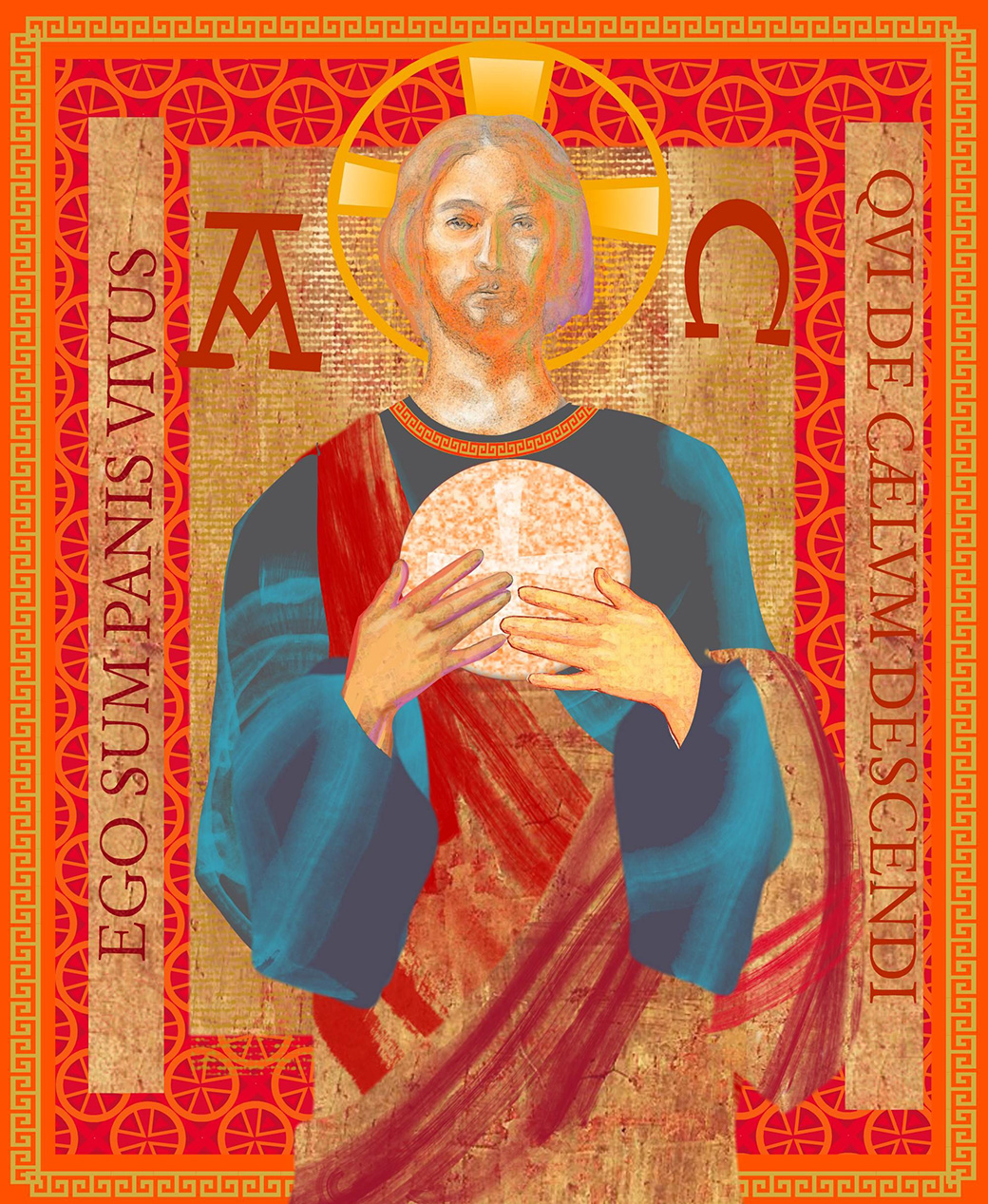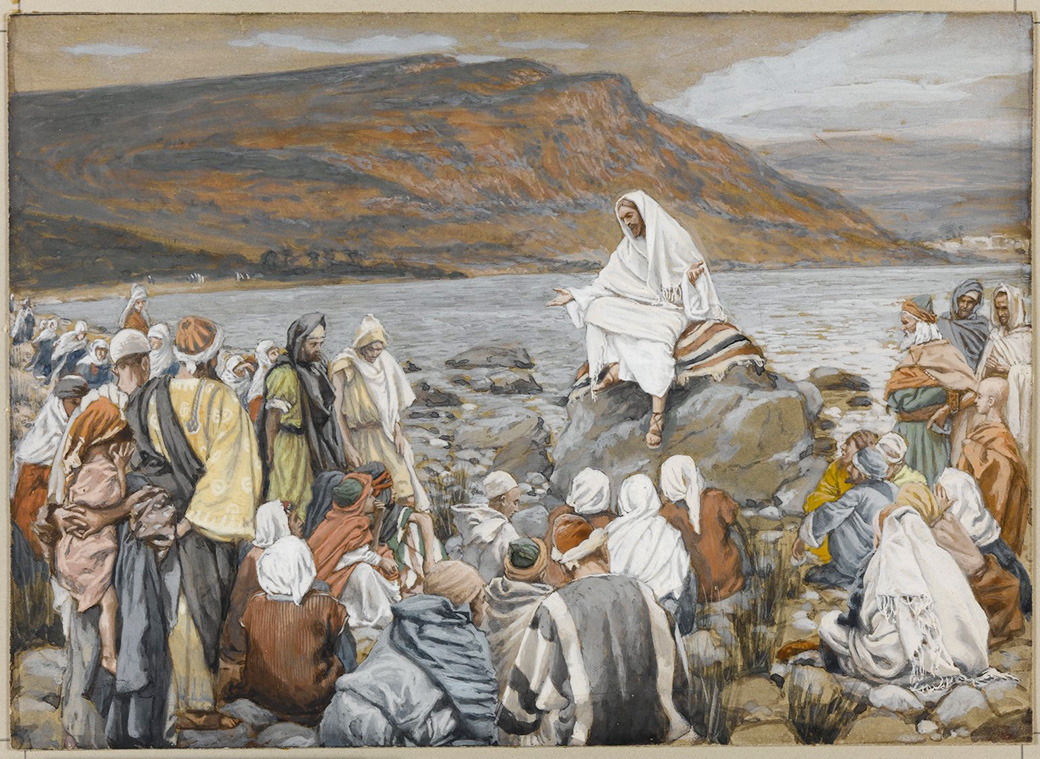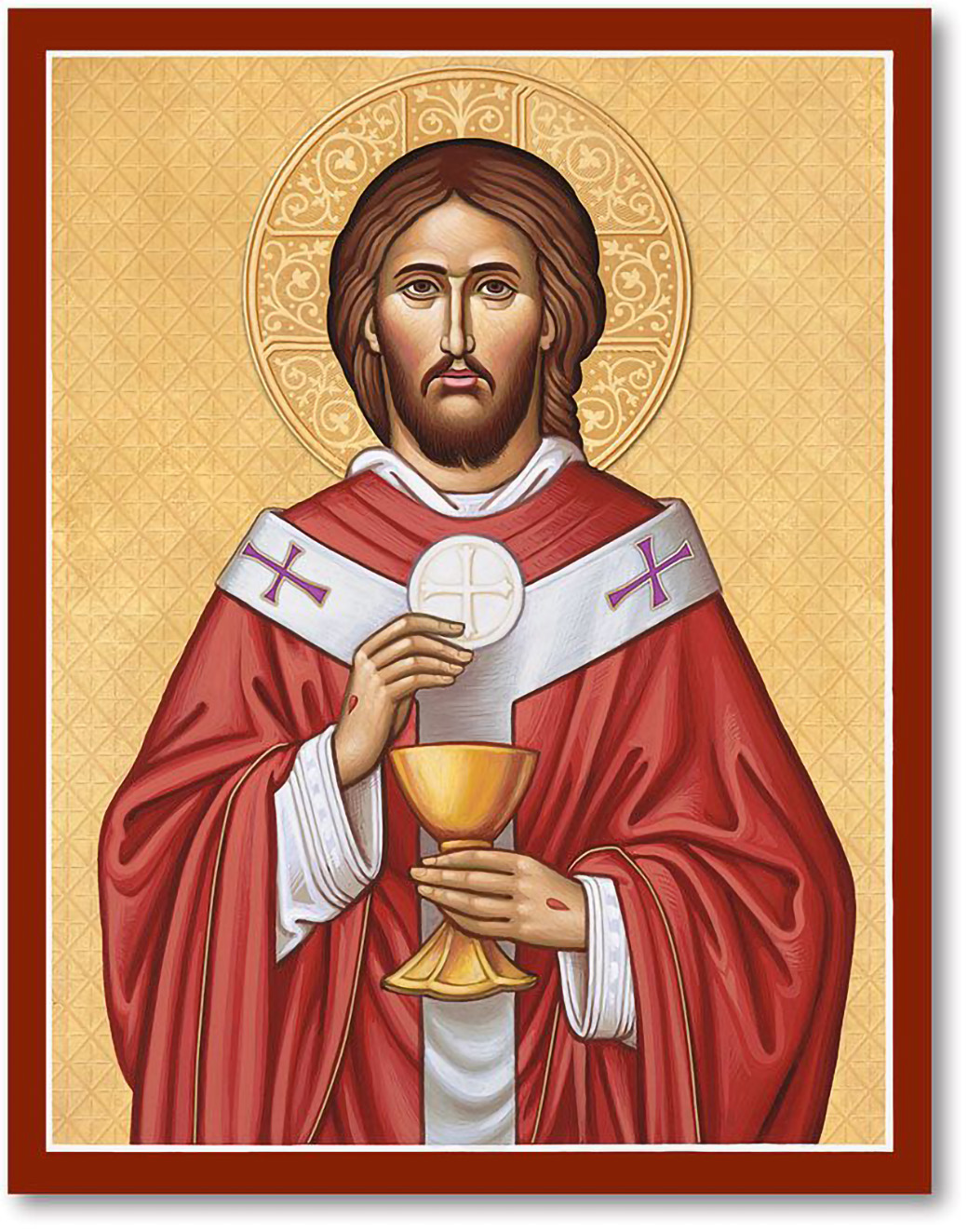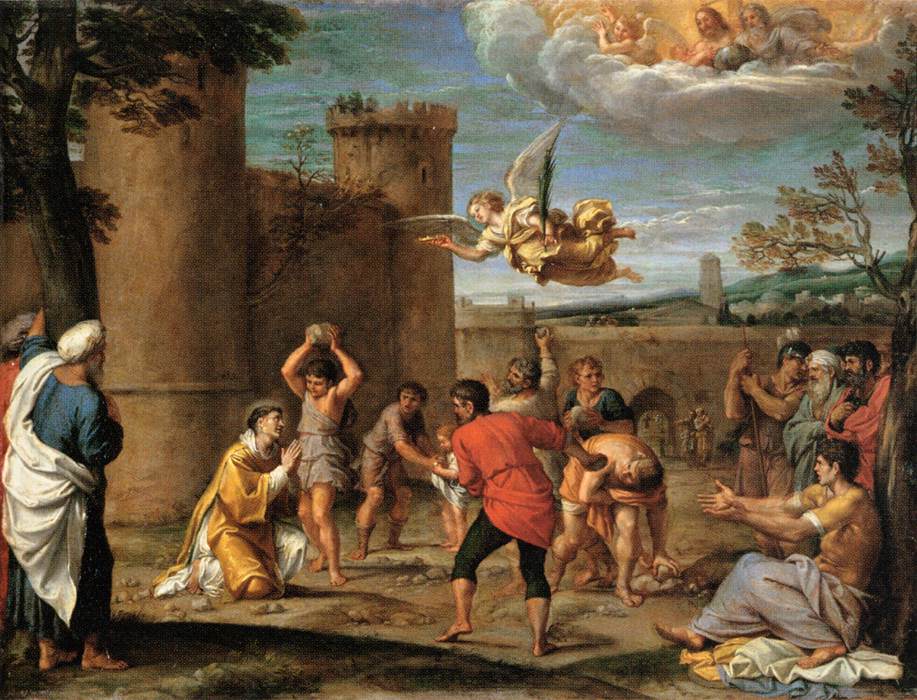Monday of the Third Week of Easter: Acts of the Apostles 6:8-15, John 6:22-29.
In today’s readings, we encounter two men — filled with the Holy Spirit and dedicated to the Father — in the moments before they speak with great eloquence to those who do not understand or believe. In the gospel, it is our Lord and Savior, Jesus Christ, who is the perfect union of mankind with God. In the first reading, it is St. Stephen, a perfect Christian, walking in the footsteps of Jesus and understanding that He is the “gate” to the Father (Jn 10:9 — “I am the gate. Whoever enters through me will be saved”).
Let’s start with the gospel reading. This passage occurs the day after the feeding of the 5,000; the crowds are looking literally all across the Sea of Galilee for Jesus and find Him at Capernaum. As is the way with Jesus’s ministry, He draws people to Himself but, once there, continuously challenges them to encounter a new reality that He is offering. Today’s gospel reading is the beginning of the great discourse on the Bread from Heaven, His own flesh. For many, it is the hardest of all of His teachings — we will hear at the end of this chapter from St. John that many followers will leave Him because of it. Let’s trace how Jesus begins this difficult teaching.

When the crowds find Him, He cuts to the chase: “you are looking for me not because you saw signs but because you ate the loaves and were filled. Do not work for food that perishes but for the food that endures for eternal life.” He is saying that they essentially want a free lunch, that they want to find Him to fill their bellies. He contrasts this to seeing “signs” of something greater. Then He encourages them to work for a different kind of food, a “food that endures for eternal life.” Let us not misinterpret Him as saying something along the lines of “don’t think of your physical needs, only think of eternity.” He never says in His ministry something like “let yourself die and join me in Heaven.” Remember, He is the Lord of Life, and living as a child of God in the world is central to His message. He is encouraging them to work for “food that endures,” in other words to feed their spirit as well as their body.
This is an interesting facet of Christ’s ministry. He is solidly focused on bringing salvation to the world (not just keeping it distantly away in Heaven). He bases His proverbs and analogies in the land (the mustard seed, the harvest, the wine, the water, the mountain) and the way people relate (the wicked manager, the thief in the night, etc.). At the same time, He always points to the Father, to the kingdom/reign of God, to a new reality and a new covenant. Thus, while He grounds His teachings in this world, He urges His followers to open themselves up to a greater reality, namely the reign of God.
This is not something foreign to the Jewish people; their life in the world has always been oriented towards God. But Jesus comes in a time when the law is fetishized by a few experts (scribes, chief priests) in a way that chokes off the saving power of God from the world. Just as they try to trap Jesus in legal arguments, they employ God’s law as a great weight around the necks of the Jewish people. The options available to Jews are to either live under the nitpicky legal codification of rituals or live in the shame of being unclean, impure, or outside of the favor of the experts. This is counter to all of salvation history, where God chooses a people upon whom He gives great favor in order for them to flourish and be a light to all nations. Jesus comes to break through this stalled state where the work of God in the world is stifled. He provides a new “Way” so that life can be lived in the way God intended, so that Israel truly can be a light to all nations.
Thus, Jesus is often trying to get his followers to break through a “dead” way of seeing things. In today’s reading, He wants them to look beyond the promise of simple food and see the “signs” His miracles represent, namely the creative power of God in the world. They pick up on his command to “work for” a different kind of food, and they respond by asking, “What can we do to accomplish the works of God?” A more literal translation that accounts for their repetition of the root word ἔργα (erga) is “What must we do, that we may work the works of God?” At first glance, this seems like a step in the right direction, perhaps even a noble thing. But remember that Jesus just pointed out that they understand the “work of God” to be feeding themselves. Their request to know “what must we do” still smacks of a limited, selfish drive to get an everlasting food supply. Their hope to “work the works of God” shows how they primarily see this as a type of conjuring.

Jesus responds, “This is the work of God, that you believe in the one he sent.” While Jesus will expand upon this statement greatly in the following verses, it stands on its own as a fantastic, compact teaching. First, let’s ask ourselves if He answers their question of “what must we do.” He responds by telling them what the work of God is. There is a difference. They are not ready to be instructed on “what to do” when they don’t even know what the work of God is. They think God’s work boils down to miracles of food or healing — a series of supernatural interventions to ease the life we have on earth. They want to know what to do so they have this miracle-working power. He directs them instead to truly understand what the work of God is.
So what does He say the work of God is? He says it is “that you believe in the one he sent.” This is a remarkable saying: the Heavenly Father’s work in the world is to seed the belief in His Anointed One, His Son. The Father’s work is to act within each of us. And this action He accomplishes is belief, or better translated “faith.” The Greek word used is πιστεύητε (pisteuēte), which is a verb form of pistis (faith). So the work of God is that we have faith in Jesus Christ. Here we can see that our work and God’s work are united in the great activity of faith — faith is work, it isn’t easy, it requires help, in fact, heavenly help. In other words, we can glimpse how Jesus’s reply fuses multiple meanings of the “work of God”: it means both the work God accomplishes as well as the “work of God” that we do. These are united in the work of faith.
And what a remarkable claim out of the mouth of Jesus that God’s work is to believe in Him, Jesus! This is one of those moments when Jesus forces us to either think He’s a self-absorbed madman or, in fact, the Savior. And since He speaks with wisdom, grace, love, and always gives glory to the Father, being a madman doesn’t fit. But why is God’s work to have faith in this one man from Nazareth in 30 AD? This is where outsiders to Christianity often stumble and brush it off as a silly deification of a guy from a detested outpost of the Roman Empire. Let’s remember that when He said these words, there were no Christians yet, so the crowds of Jews who heard it may very well have been thinking the same thing: what an odd thing for someone to say! God’s work in the world is for us to have faith in this guy?
But in the same breath, He is clearly not just “some guy.” Apart from the signs and miracles He makes, there is something that draws crowds to Him, that draws people to give up their livelihoods, their pride, their earthly concerns to abruptly follow Him. In everything He does, from preaching to healing, He is set apart from everyone else. In fact, the word Jesus uses when He refers to Himself as “the one whom God sent,” ἀπέστειλεν (apesteilen), means to be sent forth (as in a mission), but also carries the connotation of being set apart. Strong’s Exhaustive Greek Concordance states that apesteilen is “From apo and stello; set apart, i.e. (by implication) to send out (properly, on a mission) literally or figuratively.” God the Father has sent Jesus into the world, has set Him apart from His fellow men, and the reason is to be revealed on the Cross and in the Resurrection.
So we come back to faith and work. God’s work, our work, is to have faith in the One He has sent. What does this mean to have faith in Him? It must mean that we believe the words that He speaks, but also the signs that he gives us: that feeding 5,000 people is a sign of the overflowing mercy and love of God active in the world, that Jesus Christ brings a new kind of nourishment, sacramental nourishment, that is the way for his followers to be a light for the rest of the world here, on earth, in this time.

As we look back to the first reading in the light of Christ’s words in the gospel, we see that St. Stephen is the manifestation of the “work of God.” He shows us what it means to have faith in Christ. In today’s reading, while we hear of the arguments, resistance, and the false witness of his opponents, we encounter a thrilling serenity in the form of Stephen. “Stephen, filled with grace and power, was working great wonders and signs among the people … [those arguing with him] could not withstand the wisdom and the Spirit with which he spoke.” He appears fully under control, yet filled with power. This power comes from God, not Stephen, and that is the difference. Despite the nasty public accusations, we hear that the Sanhedrin “saw that his face was like the face of an angel.” What a gift to be so united with the will of God, doing the work He calls you to do! It manifests visibly upon Stephen’s face.
We are told in the verses prior to today’s reading that Stephen is “a man full of faith and the Holy Spirit (Acts 6:5). Here, then is the example and proof of what Jesus meant when he said the work of God is to have faith in the One He sent. This condition of having faith in Christ means that you believe in His Sonship with the Father, you believe in His work of redemption at Easter, in the new state of human history made possible by Him where we can live differently with one another under the reign of God. Stephen is graced by God to be an example for us.
Of course there are those who do not have faith in Jesus Christ, and those who allow evil to settle in their hearts. That is why there is persecution and suffering and why the reign of God is not yet complete. And Jesus gave us the way to encounter these people: to speak the truth of God’s love and plan for humanity and to leave open the door to repentance. This is what Stephen does in his great speech to the Sanhedrin in the following verses, which is an extended recounting of salvation history in the lives of the Jews, focused on times when they were deaf to God and turned their backs on his providence. He ends with the hard truth that these very men to whom he was speaking murdered the Son of God.

The end for Stephen, as we all know, is his stoning at the hands of these enraged Jews. Yet lest we think that the way of the Cross is nothing but torture and suffering, we will hear in tomorrow’s reading how Stephen looks up to heaven and sees the glory of God and how he meets his end with a certain peaceful unity with God. The way is certainly hard, but when filled with the Holy Spirit, the saints can endure (even joyfully so) the hard way.
Let’s consider that this, too, is the work of God.